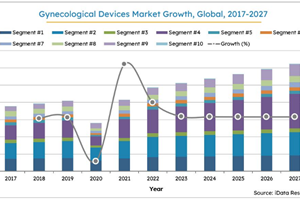In a groundbreaking exploration that challenges conventional norms, researchers from Beijing Obstetrics and Gynecology Hospital have discovered a potential link between thyroid-stimulating hormone (TSH) levels during early pregnancy and an increased risk of gestational diabetes. Their findings, published in The Journal of Clinical Endocrinology & Metabolism, open a new chapter in understanding the complexities of pregnancy, suggesting that even normal-range TSH levels may impact maternal health.
The study, a prospective cohort involving 26,742 pregnant women receiving regular prenatal care between February 2018 and December 2021, meticulously analyzed blood samples collected between 6 and 13 weeks of gestation. The primary objective was to measure thyroid hormone levels, and a subsequent 2-hour oral glucose tolerance test conducted between 24 and 28 weeks gestation aimed to evaluate the presence of gestational diabetes.
The results revealed a significant revelation. Out of the participants, 14.9% were diagnosed with gestational diabetes. Further analysis showcased that women with gestational diabetes exhibited higher TSH levels, lower free thyroxine levels, and a higher prevalence of thyroid peroxidase antibody positivity compared to their counterparts without gestational diabetes. Adjusting for various factors, the researchers found a significant association between elevated TSH levels and a heightened likelihood of gestational diabetes.
Delving deeper into the data, the study classified participants into quintiles based on TSH and free T4 levels. The findings were striking—women in the three highest quintiles for TSH demonstrated a greater predisposition to developing gestational diabetes than those in the lowest quintile. Adding another layer of complexity, a subgroup analysis based on prepregnancy BMI revealed that women with a BMI of 24 kg/m2 or higher in the highest TSH quintile faced an elevated risk of gestational diabetes compared to their counterparts in the lowest quintile.
These findings carry significant weight, indicating that higher TSH levels may amplify the risk of gestational diabetes, especially in women with a prepregnancy BMI of 24 kg/m2 or higher. The study highlights the need for further exploration, acknowledging that other potential influencing factors were not measured in this analysis.
This research transcends the conventional understanding of thyroid function during pregnancy, adding a layer of complexity by suggesting that even within normal TSH ranges, there may be nuances affecting maternal health. The implications of this study are far-reaching, opening avenues for future research and potential interventions aimed at safeguarding maternal well-being during this critical phase of life.
As we continue to unravel the intricacies of pregnancy, this study marks a significant step towards personalized care and a deeper comprehension of the delicate interplay between thyroid health and gestational diabetes. The findings call for increased awareness among healthcare professionals about the potential risks associated with elevated TSH levels during early pregnancy and the need for tailored interventions, especially for women with higher prepregnancy BMIs.
Furthermore, the study sheds light on the potential interplay between thyroid function and gestational diabetes in the context of varying BMI levels. While the general association between elevated TSH and gestational diabetes is noteworthy, the subgroup analysis based on prepregnancy BMI introduces a fascinating dimension to the research.
It is crucial to understand that gestational diabetes poses significant health risks not only for the mother but also for the developing fetus. Complications can include macrosomia (excessive birth weight), neonatal hypoglycemia, and an increased likelihood of cesarean section. Therefore, identifying potential risk factors becomes paramount in mitigating these adverse outcomes.
The findings from this study prompt a reevaluation of existing prenatal screening protocols. Traditionally, thyroid function tests during pregnancy have primarily focused on detecting hypothyroidism or hyperthyroidism, conditions that fall outside the normal range. However, this research suggests that even within the normal range, subtle variations in TSH levels may have implications for gestational diabetes risk.
This revelation encourages healthcare professionals to adopt a more nuanced and comprehensive approach to thyroid screening during prenatal care. Routine monitoring of TSH levels, especially in the early stages of pregnancy, could provide valuable insights into a woman's risk profile for gestational diabetes. Implementing such measures may empower healthcare providers to tailor interventions and support strategies more effectively.
Moreover, the study underscores the importance of considering thyroid peroxidase antibodies in the assessment of gestational diabetes risk. The higher prevalence of these antibodies in women with gestational diabetes suggests a potential immune system involvement in the pathogenesis of the condition. Further research into the immunological aspects of gestational diabetes could unveil novel avenues for preventive and therapeutic interventions.
As the scientific community grapples with the implications of this groundbreaking research, collaboration and further investigations are essential. Replication studies across diverse populations and exploration of potential confounding factors not addressed in the initial research could enhance the robustness and generalizability of these findings.
The study from Beijing Obstetrics and Gynecology Hospital significantly expands our understanding of the intricate relationship between thyroid function and gestational diabetes. It not only challenges established norms but also opens the door to a more refined and personalized approach to maternal care. The potential impact of elevated TSH levels, even within the normal range, highlights the need for ongoing research and the development of evidence-based guidelines for thyroid screening during pregnancy.
As we celebrate the one-year anniversary of this groundbreaking research, it is evident that the journey towards unraveling the complexities of pregnancy continues. The collaboration between researchers, healthcare professionals, and policymakers is crucial in translating these findings into meaningful changes in maternal healthcare practices, ultimately ensuring the well-being of both mothers and their unborn children.
Healio.com – Michael Monostra – Edited by Mohammad Khazem











